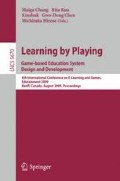Abstract
Despite the fact that greater importance has been attached to educational games, the design, development and application of computer games oriented to disaster education is rarely researched. This paper, therefore, attempts to make use of first aid knowledge targeting teenagers to develop a role-playing computer game oriented to disaster education under the guidance of fuzzy strategy. The paper also reflects on some existing problems after a preliminary experiment with the game.
Access this chapter
Tax calculation will be finalised at checkout
Purchases are for personal use only
Preview
Unable to display preview. Download preview PDF.
References
Yin, J.: A Brief Discussion on the Disaster Education and Treatment in Science of Senior School’s Instruction (in Chinese). Science Education Research 10, 45–46 (2005)
Zhang, G., Ma, D.: The Present Situation Analysis and Development Research of Educational Games (in Chinese). E-Education Research 2, 68–72 (2008)
Fang, S.: The Scenario Design and Program Development of Educational Game Software Based on Context Instruction (in Chinese). National Center University, Taiwan (1994)
Hallford, N., Hallford, J.: Swords&Circuitry: A Designer’s Guide to Computer Role-Playing Games, p. 48. Tsinghua University Publishing House, Beijing (2006)
Su, Z.: The Fuzzy Strategy of Language in Oral Communication (in Chinese). Northeast Normal University, Changchun (2004)
Zhao, H., Zhu, Z.: The Analysis of Definitions and Typology about Educational Game (in Chinese). In: 10th GCCCE 2006 Collected Papers, pp. 39–46. TsingHua University Publishing House, Beijing (2006)
Han, Q., Li, Y.: The Discussion of Roles Online Games playing in Distance Education (in Chinese). Chinese Distance Education 15 (2003)
Rouse III, R.: The Theory and Practice of Game Design, pp. 369–371. Electronic Industry Publish Company, Beijing (2003)
Yang, S.: The Key Factor to Make Our Computer Games Successful (in Chinese). National Traffic University, Taiwan (2003)
Author information
Authors and Affiliations
Editor information
Editors and Affiliations
Rights and permissions
Copyright information
© 2009 Springer-Verlag Berlin Heidelberg
About this paper
Cite this paper
Zhang, S., Gu, H. (2009). Construction of a Computer Game Oriented to Disaster Education and Reflections on Its Problems. In: Chang, M., Kuo, R., Kinshuk, Chen, GD., Hirose, M. (eds) Learning by Playing. Game-based Education System Design and Development. Edutainment 2009. Lecture Notes in Computer Science, vol 5670. Springer, Berlin, Heidelberg. https://doi.org/10.1007/978-3-642-03364-3_15
Download citation
DOI: https://doi.org/10.1007/978-3-642-03364-3_15
Publisher Name: Springer, Berlin, Heidelberg
Print ISBN: 978-3-642-03363-6
Online ISBN: 978-3-642-03364-3
eBook Packages: Computer ScienceComputer Science (R0)

